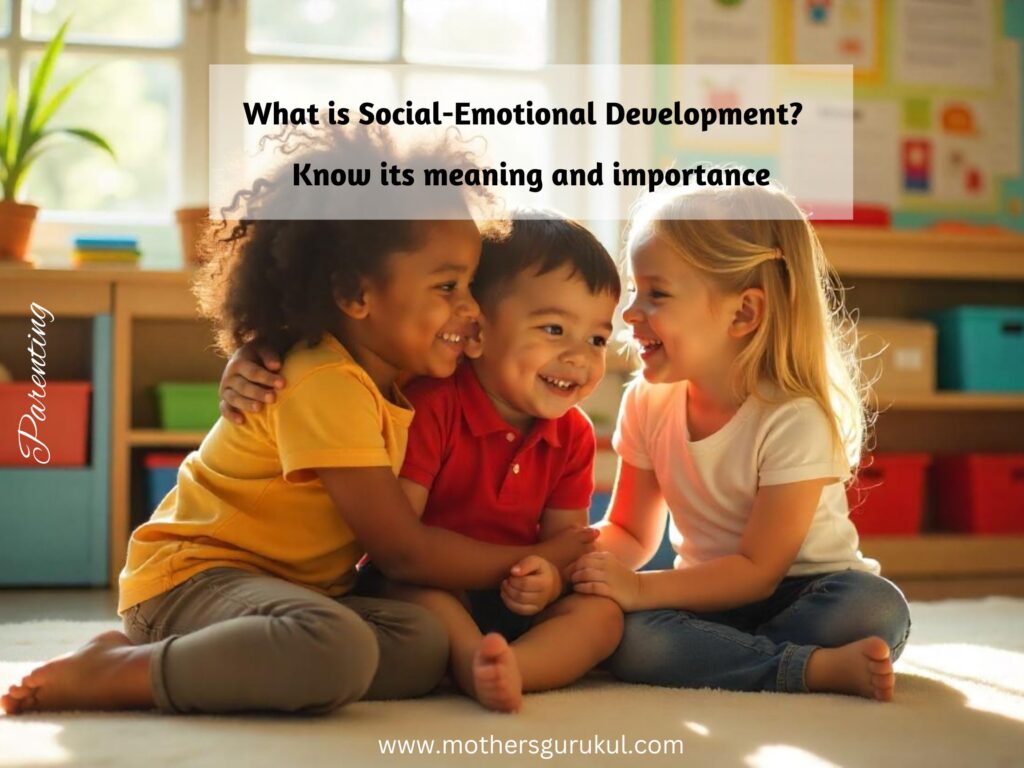Social-emotional development in early childhood is the foundation to a child’s overall well-being and success in life. This critical aspect of development encompasses the skills and abilities that enable children to understand and manage their emotions, establish and maintain positive relationships, and navigate social environments effectively. It is during these formative years that children develop the capacity to express empathy, regulate their emotions, and build the social competence necessary for lifelong success.

What is Social-Emotional Development?
Social-emotional development refers to the process by which children acquire the ability to understand their own and others’ emotions. They also learn to establish and maintain positive relationships, and to develop a sense of self-worth and confidence. This development is influenced by a range of factors, including biological predispositions, early experiences, and interactions with caregivers and peers.
Key components of social-emotional development include:
- Emotional Regulation: The ability to manage and respond to emotions in a healthy and constructive manner.
- Empathy: The capacity to understand and share the feelings of others.
- Social Skills: The ability to interact positively and effectively with others.
- Self-Awareness: Understanding one’s own emotions, strengths, and weaknesses.
- Relationship Skills: The ability to form and maintain healthy, rewarding relationships with others.
The Role of Caregivers and Early Childhood Educators
Caregivers and early childhood educators play a crucial role in fostering social-emotional development. They provide the emotional support and guidance that children need to navigate their emotions and relationships. Positive interactions with caregivers and educators can significantly influence a child’s ability to develop social-emotional skills.
- Responsive Caregiving: Responsive caregivers who are attuned to a child’s needs and emotions provide a secure base. This helps the child can explore the world and develop social-emotional competencies. This includes recognizing and responding to a child’s emotional cues, providing comfort when needed, and encouraging exploration and independence.
- Modeling Positive Behavior: Children learn by observing the behavior of the adults around them. Caregivers and educators who model positive social interactions, empathy, and emotional regulation provide valuable examples for children to emulate.
- Creating a Supportive Environment: A nurturing and supportive environment that promotes trust, safety, and respect is essential for social-emotional development. This includes establishing consistent routines, setting clear expectations, and providing opportunities for children to practice social skills through play and interaction.
The Role of Preschool and Daycare
Preschool and daycare play a vital role in social-emotional development. They provide structured environments where children can learn and practice essential social skills. These settings offer opportunities for children to interact with peers, engage in group activities, and develop relationships with caring adults outside their families. Preschool and daycare provide the advantage of consistent routines and diverse social interactions, which help children develop a sense of security, independence, and adaptability.
- Social Interaction: Preschools and daycares provide children with regular opportunities to interact with peers. These interactions help children learn important social skills such as sharing, taking turns, and resolving conflicts. Through play and collaborative activities, children learn to navigate social situations and develop positive relationships.
- Emotional Support: Early childhood educators in preschools and daycares offer emotional support and guidance to children. They help children understand and manage their emotions, teaching them strategies for coping with frustration, disappointment, and other challenging emotions. This emotional support is crucial for building resilience and emotional regulation skills.
- Structured Environment: Preschools and daycares offer structured routines and activities that help children develop a sense of predictability and security. Consistent routines provide a framework within which children can explore and learn, contributing to their overall sense of well-being and confidence.
- Learning Through Play: Play is a fundamental aspect of early childhood education, and preschools and daycares emphasize learning through play. Play-based activities encourage creativity, problem-solving, and social interaction, all of which contribute to social-emotional development. Children learn to negotiate, cooperate, and communicate effectively through play.
- Parental Involvement: Many preschools and daycares actively involve parents in their child’s education and development. This partnership between educators and parents ensures that social-emotional learning continues at home, creating a consistent and supportive environment for the child.
The Impact of Social-Emotional Development on Academic Success
Research has shown that social-emotional development is closely linked to academic success. Children who possess strong social-emotional skills are better equipped to handle the challenges of the classroom and to engage in learning.
- Improved Classroom Behavior: Children who can regulate their emotions and behavior are more likely to follow classroom rules, stay focused on tasks, and engage positively with their peers and teachers.
- Enhanced Learning Outcomes: Social-emotional competencies such as self-regulation, perseverance, and the ability to work collaboratively are associated with better academic performance. These skills enable children to manage stress, stay motivated, and overcome obstacles.
- Positive Attitudes Towards School: Children with strong social-emotional skills are more likely to enjoy school and to have positive attitudes towards learning. This fosters a love of learning and a desire to succeed academically.
Long-Term Benefits of Social-Emotional Development
The benefits of social-emotional development extend far beyond early childhood and have long-term implications for an individual’s overall well-being and success in life. Some of the long-term benefits include:
- Healthy Relationships: Individuals with strong social-emotional skills are better equipped to form and maintain healthy, fulfilling relationships throughout their lives. They can communicate effectively, resolve conflicts constructively, and build strong social networks.
- Emotional Resilience: Social-emotional competencies such as emotional regulation and empathy contribute to greater emotional resilience. Individuals who can manage their emotions and cope with stress are better able to navigate life’s challenges and maintain mental health.
- Career Success: The social skills developed in early childhood are essential for success in the workplace. Effective communication, teamwork, and problem-solving abilities are highly valued by employers and contribute to career advancement.
- Overall Well-being: Social-emotional development is closely linked to overall well-being and life satisfaction. Individuals with strong social-emotional skills are more likely to experience positive mental health, higher self-esteem, and a greater sense of fulfillment.
Strategies to Support Social-Emotional Development
Parents, caregivers, and educators can employ various strategies to support and enhance social-emotional development in young children:
- Encourage Emotional Expression: Create a safe and supportive environment where children feel comfortable expressing their emotions. Validate their feelings and help them label and understand their emotions.
- Teach Emotional Regulation: Provide children with tools and strategies to manage their emotions. This can include deep breathing exercises, mindfulness practices, and techniques for calming down when upset.
- Promote Empathy: Encourage children to consider the perspectives and feelings of others. Engage in activities that foster empathy, such as reading stories about diverse characters, discussing emotions, and practicing acts of kindness.
- Foster Social Skills: Provide opportunities for children to interact with peers and practice social skills. This can include cooperative play, group activities, and role-playing scenarios to teach sharing, taking turns, and effective communication.
- Build Self-Awareness: Help children develop self-awareness by encouraging them to reflect on their emotions, strengths, and areas for improvement. Provide positive feedback and celebrate their achievements.
- Model Positive Behavior: Demonstrate positive social interactions, emotional regulation, and empathy in your own behavior. Children learn by observing adults, so be mindful of the example you set.
- Create Consistent Routines: Establish consistent routines and clear expectations to provide a sense of security and predictability. This helps children feel safe and confident in their environment.
- Provide Positive Reinforcement: Use positive reinforcement to encourage and reward positive social-emotional behaviors. Praise children for their efforts and successes in managing emotions and interacting positively with others.
Conclusion
Social-emotional development in early childhood is a critical aspect of a child’s overall development and well-being. By nurturing social-emotional skills, caregivers and educators can help children build a strong foundation for academic success, healthy relationships, emotional resilience, and long-term well-being. Preschools and daycares play a vital role in this process by providing structured, supportive environments where children can learn and practice these essential skills. Investing in social-emotional development during the early years is an investment in a child’s future, setting them on a path to a fulfilling and successful life.
By understanding the importance of social-emotional development and implementing supportive strategies, we can create environments that foster the growth and development of well-rounded, emotionally intelligent individuals.
Author Bio:
Chitra Khanna is the Content Strategist at KLAY Schools, where she leads content creation focused on early childhood education and parenting. With a background in digital marketing and a passion for empowering families, Chitra develops resources that engage and inform parents, helping them navigate the critical stages of their children’s development. Her creative approach and deep understanding of educational trends ensure that her content is both relevant and impactful. Outside of work, Chitra enjoys exploring new learning methodologies and contributing to discussions on child welfare and growth.
